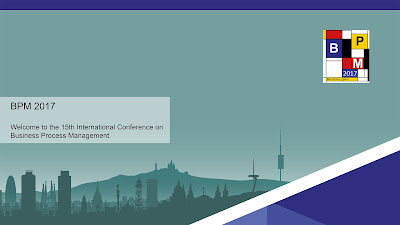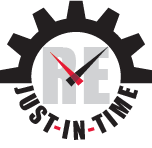This year, the 15th BPM has been hosted by the Universitat Politècnica de Catalunya, in Barcelona.
Although I didn't have any paper published in the conference, I had the opportunity to do my bit.....
Friday, September 15, 2017
Tuesday, August 22, 2017
Paper accepted at the 1st International Workshop on Managing Quality in Agile and Rapid Software Development Processes
Agile Quality Requirements Management Best Practices Portfolio: A Situational Method Engineering Approach
Lidia López, Woubshet Behutiye, Pertti Karhapää, Jolita Ralyté, Xavier Franch and Markku Oivo
Abstract. Management of Quality Requirements (QRs) is determinant for the success of software projects. However, this management is currently under-considered in software projects and in particular, in agile methods. Although agile processes are focused on the functional aspects of the software, some agile practices can be beneficial for the management of QRs. For example, the collaboration and interaction of people can help in the QR elicitation by reducing vagueness of requirements through communication. In this paper, we present the initial find-ings of our research investigating what industrial practices, from the agile methods, can be used for better management of QRs in agile software development. We use Situational Method Engineering to identify, complement and classify a portfolio of best practices for QR management in agile environments. In this regard, we present the methodological approach that we are applying for the defini-tion of these guidelines and the requirements that will lead us to compile a portfo-lio of agile QR management best practices. The proposed requirements correspond to the whole software life cycle starting in the elicitation and finalizing in the deployment phases.Co-located to the 18th International Conference on Product-Focused Software Process Improvement (PROFES 2017).
Monday, July 31, 2017
A really hard first semester
This has been a specially hard first semester, I have been involved in too many research related activities that I was not able to do research!!!!!
I belonged to 14 program committees, so I reviewed something like 30 conference and workshop papers, and a couple of journal papers. My apologies if I arrived a bit late this year to my compromises.
Happy Holidays!!!!
Thursday, July 27, 2017
Paper accepted at the 4th International Workshop on conceptual Modeling in Requirements and Business Analysis
Towards an Ontology for Strategic Decision Making: The Case of Quality in Rapid Software Development Projects
Cristina Gómez, Claudia Ayala, Xavier Franch, Lidia López, Woubshet Behutiye, Silverio Martínez-Fernández
Abstract. Strategic decision making is the process of selecting a logical and informed choice from the alternative options based on key strategic indicators determining the success of a specific organization strategy. To support this process and pro-vide a common underlying language, in this work, we present an empirically-grounded ontology to support different strategic decision-making processes and extend the ontology to cover the context of managing quality in Rapid Software Development projects. We illustrate the complete ontology with an example.
Co-located to the 36th International Conference on Conceptual Modeling (ER 2017). I was going to the ER since 2011, but I missed the last edition (2016) and I was not going to be there this year either. But, maybe this year will be able to come back!
Saturday, July 1, 2017
Paper accepted at Just-in-Time RE 2017 workshop, co-located at RE
Data-driven Requirements Engineering in Agile Projects: The Q-Rapids Approach
Xavier Franch, Claudia Ayala, Lidia López, Silverio Martínez-Fernández, Pilar Rodríguez, Cristina Gómez, Andreas Jedlitschka, Markku Oivo, Jari Partanen, Timo Räty, Veikko Rytivaara
Abstract. Requirements identification, specification and management are key activities in the software development process. In the last years, many approaches to these activities have emerged, based on the exploitation of huge amounts of data gathered from soft-ware repositories and system usage. The Q-Rapids project pro-poses the collection and analysis of such data and its consolidation into a set of strategic indicators as product quality, time to market and team productivity. These indicators are visualized through a dashboard designed to support decision-makers. In this paper, we present the ongoing research undertaken in this project. We use the concept of blocking situation to exemplify the Q-Rapids approach.
Tuesday, June 13, 2017
iStar 2017 is over, we will see you next year!!!
This has been a special edition of the workshop, it has been a pleasure chairing the 10th iStar workshop with Lin Liu and Sepideh Ghavanati.
This year has been a really nice workshop, we had 17 papers, 12 regular presentations and 5 short presentations. The organization committee wanted to celebrate the 10th anniversary having a really interactive workshop, so we had 2 keynotes and two panels. All of it distributed in a 2-day workshop.
We also have to say that we had a good time in Essen.
Remember that the proceedings are available at CEUR-WS (Vol. 1829): http://ceur-ws.org/Vol-1829/
Thank you the steering committee for choosing me as part of the organization committee and all the authors for choosing iStar 2017 to share their work.
Friday, April 28, 2017
Paper accepted at the 10th International i* Workshop (iStar 2017)
Dealing with Goal Models Complexity using Topological Metrics and Algorithms
Lucía Méndez Tapia, Lidia López , Claudia P. Ayala
Abstract. The inherent complexity of business goal-models is a challenge for
organizations that has to analyze and maintaining them. Several approaches are
developed to reduce the complexity into manageable limits, either by providing
support to the modularization or designing metrics to monitor the complexity
levels. These approaches are designed to identify an unusual complexity
comparing it among models. In the present work, we expose two approaches
based on structural characteristics of goal-model, which do not require these
comparisons. The first one ranksthe importance of goalsto identify a manageable
set of them that can be considered as a priority; the second one modularizes the
model to reduce the effort to understand, analyze and maintain the model.
Subscribe to:
Comments (Atom)







